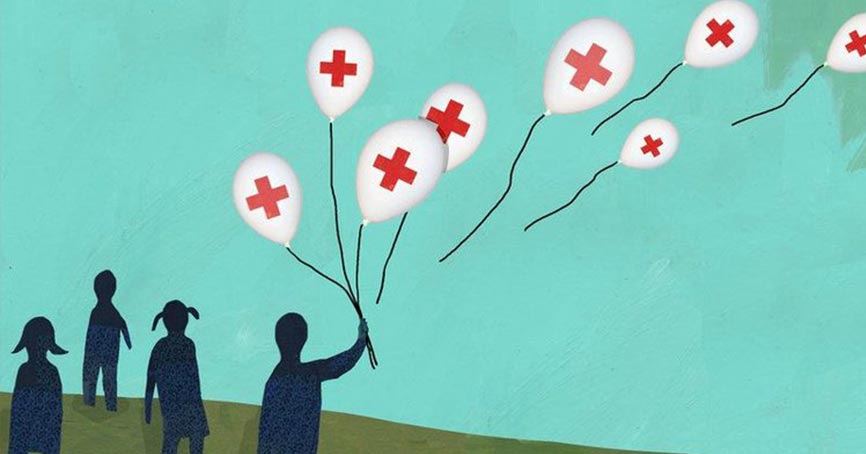Even after several precautions, one may end up with cold or flu. When there is a sudden change in temperature, the body tries to balance itself more quickly than normal. As a result, it weakens the resistance towards virus. In other words, you are the most contagious when suffering from cold or flu.
Flu & Cold - The Most Contagious Infections
The head feels hammered, the throat is sore, and one's body aches. One may also suffer from a runny nose and severe headache. Sneezing, coughing and fever are all signs that one might be transmitting diseases and suffering from flu and cold.
It might be comforting to stay at home but the work priorities might not allow the patient. Going to the office is not a wise decision since the co-workers might contract infection.
Flu and Cold are often confused and used interchangeably. Let us understand the difference between the two.
Difference Between Flu & Cold
The Common Cold
As mild as it sounds, cold is the most contagious disease in the world. It is usually caused by viruses called rhinovirus or corona-virus and other 200 strains. Even if the body builds antibodies to one strain, one could catch cold from the other. Since antibiotics don't destroy viruses, no medication is suggested for a common cold. OTC drugs could help alleviate some of the indications.
Influenza (Flu)
Flu is completely different from a common cold. It is caused by Influenza A or B virus accompanied by high fever. For people with low immunity, flu can be quite serious or in some cases, even life-threatening. The government also offers free vaccinations for some high-risk groups. However, the flu virus transmutes very quickly, and the vaccine does not protect against all strains. Speak to a Doctor if you would like to know more about flu and its prevention.
Cold is a milder respiratory illness than the flu. While cold indications can make one feel sick for 2-3 days, flu can make a person severely sick for a few days to weeks. The flu can also cause severe health problems such as pneumonia, bronchitis and hospitalizations.
Am I Contagious?
Each time you cough or sneeze due to a respiratory infection, you discharge germ-filled pellets into the air. Those virus-filled particles can fly up to several feet making anyone near you a target. You also spread viruses when you touch your nose, eyes, or mouth and then touch surfaces or places with those germy fingers. Certain germs can last on surfaces such as doorknobs, countertops, and phones for up to 24 hours.
When to Call Sick?
Sick and feeling out of shape? Avoid sharing the infection with those around and follow general health guidelines.
When thinking about whether to stay home, consider your symptoms. If you have a mild prickle in your throat or a stuffy nose, you are fine to go to work. Allergic reactions also do not need to keep you from work as they are not infectious.
However, if you are really coughing and sneezing a lot, do stay at home.
Take plenty of rest, drink lots of fluids, and wait for your symptoms to drop. As per an article published in TRIB live, it is recommended to take rest for 24 hours after flu, and flu-like symptoms have cleared up.
Prevention Before Cure
Common cold and flu are the most contagious infections. Both of these infections are spread by viruses. The viruses are present in water droplets which come out of the mouth and nose when an infected person coughs or sneezes. These infectious droplets may land on places or surfaces, tainting them with traces of cold or flu virus. To eradicate the risk of catching a cold or flu, you should:
- get a flu vaccine
- wash hands frequently or use sanitizer for easy usage
- keep your hands off your mouth, eyes and nose as they are the parts from where germs can enter the body
- strengthen your immunity by exercising
- have plenty of fluids
- consume pro-biotic foods like Kefer, Kimchi, Yogurt, etc
- get plenty of sleep. It is suggested to have proper sleep for a healthy immune system.
Cure & Remedies
Even after being precautious you might get hit by viruses, keep in track with these safe home remedies:
- Keep your body warm as sweating results in subsiding cold.
- Go on a vegetable soup diet.
- Hot spice tea with ginger and cardamom is suggested.
- Put mustard oil into your nostril to let go excess phlegm.
- Take a mix of jaggery and black pepper. Boil it in water to ease fast from the condition.
- Water and lemon lessen the nasal congestion.
If the symptoms persist, it is time to see the doctor. Do not be negligent of your health. "Your body is the most priceless possession. Take care of it."

 Aug 02, 2018
Aug 02, 2018
 May 30, 2018
May 30, 2018 May 10, 2018
May 10, 2018 May 17, 2018
May 17, 2018